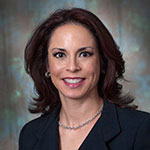1983–1986
Chris Luna, born and raised in Houston, attended law school at the University of Texas at Austin. Growing up, he found himself attracted to debate teams and often volunteered to moderate, emcee, and judge school events, but it was Luna’s observation of an older sibling that convinced him to pursue a law degree. “My brother was a lawyer, and I was fascinated when he would talk to me about what he was studying, thinking, and doing,” he says. “That’s where the legal profession became a clear path for me.”
1986-1987
Upon graduation, Luna accepted a yearlong judicial clerkship with a federal bankruptcy judge in Dallas. “Judge McGuire was a great mentor,” says Luna. “He taught me the importance of preparation, fairness, and following a code of ethics. When you’re in a courtroom but are not getting paid to argue either side of the case, you have a great opportunity to observe, research, and listen. I got to watch really good lawyers perform.” Luna got to watch bad lawyers, too. He saw what worked and what didn’t, what impressed the judge and what annoyed him. He also greatly improved his writing skills by drafting memos and opinions.
1988–1991
Luna was recruited by the large, national firm Akin Gump and started in their Dallas office. “I thought I would never work at a large firm because I didn’t want to be just another cog in the wheel, but it turned out to be the best experience I could have had,” he says. Luna signed with Akin because he had seen effective and well-trained lawyers who argued cases in teams consisting of junior and senior attorneys. He knew he would get challenging work, and the firm’s dedication to pro bono work produced well-rounded professionals.

In 1991, Luna handled a bankruptcy case that was appealed to the Fifth Circuit Court of Appeals in New Orleans. Although Akin Gump had appellate lawyers, the firm decided to let Luna argue the case himself. “Instead of being scared of the risk of something I had never done, I looked at it as an opportunity to master a new area. That concept has often resurfaced in my career,” he says. Akin Gump’s appellate team trained and assisted Luna, but he mastered the facts to win the case. Luna proved his courage and capability to the clients, the firm, and to himself. It could have defined the rest of Luna’s tenure at Akin Gump, but in the latter half of 1991 his career took an unexpected turn.
1991–1997
When Dallas went to single-member districts in 1991, Luna lived in an area with no incumbent and decided to run for city council. He won by 156 votes, earning the nickname “Landslide Luna” among friends. Luna gave up his high-paying job at Akin Gump and accepted a council stipend of $50 per meeting. He continued to practice law on his own but devoted most of his time to representing the roughly 90,000 residents in his urban district. Luna went on to serve three consecutive terms—a risky move considering a hiatus from law might harm his chances of returning to a major firm. But for Luna, the decision was easy. “I believe that if exceptional people only do business, or law, or medicine, then government becomes the lowest common denominator. It is possible to be successful and do public service,” he says. Luna represented a neglected area with a majority Latino population. He and other council members took steps to introduce bond programs, capital expenditures, and infrastructure improvements. Luna was also elected by his colleagues to serve as the city’s first Hispanic deputy mayor pro tem.
1998–2000
After his run in the city council, Luna had one major private client: Tri-City Health Centre. When the company asked him to become its first and only in-house lawyer, he accepted. At Akin Gump he was accustomed to having the most brilliant minds at his disposal, but now Luna found himself practicing alone. The period, he says, taught him to become self-sufficient and acquire important business and management skills. “The city of Dallas had 12,000 employees and a $1.2 billion budget, so I was able to transfer what I learned in public service to the professional world,” he remarks.
2003–2004
A few years later, Luna received a phone call from a headhunter. He was recruited to a telecommunications company and accepted the job. When the company’s general counsel later moved to MetroPCS, Luna followed.
2005–2007
When Luna started at MetroPCS in 2005, the private wireless service provider was growing by acquiring “spectrum” (the system on which carriers build their networks) from FCC auctions and private sales. By 2006, he was preparing MetroPCS for an IPO. “Again in my career, I had to do something I hadn’t done before, but at this point, I had total confidence in my abilities,” says Luna. “With the rest of the legal team, he worked on registrations, filings, and due diligence. They had to be precise or the company could open itself to future litigation.
2007-2011
Going public in 2007 was one of the ways MetroPCS would continue its growth. The company opened more regional offices and entered additional deals to sell products and services through authorized dealers and national retailers. In just four years, MetroPCS tripled the number of employees and doubled its revenue. Luna led the legal team that supported the operational issues related to expansion. Luna was dealing with labor and employment issues, sales and distribution, state legislative affairs, and complex litigation. The legal team added experts in securities, patent litigation, and technology transactions. Meanwhile, in the civic realm, Luna was appointed to serve on the board of the county hospital from 2009 to 2011.
2013
In 2012, MetroPCS made the Fortune 500 list. It had grown to serve 9 million customers and reach $5 billion in revenue. That’s when MetroPCS made the strategic decision to merge with T-Mobile. Luna and the legal team worked on the merger and the subsequent integration. The transaction closed on May 1, 2013. MetroPCS rode T-Mobile’s network into 30 new cities from Houston, to Seattle to Denver to Washington, DC, etc. Luna’s eclectic experience has helped take the brand to new heights, and his plan is to help MetroPCS continue its growth into 2014 and beyond.

